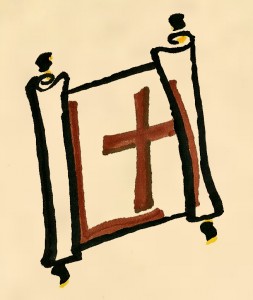Study #4: The Nephilim
By ERIC SIEVERS
Ever since I first read about the Nephilim when I was a teenager, I was always fascinated by them. Indeed, the idea of a race of “Supermen” has always intrigued us, throughout history. Achilles, Hercules, Arthur, Beowulf, Romulus and Remus are all examples of this. The Nazi Germans were obsessed with it, and modern science to this day still strongly flirts with the idea of creating a “genetically perfect” super being.
So who, or what, were the Nephilim? There is much controversy to this day regarding this question, as the Bible itself is very unclear about it. Indeed, the Hebrew word itself, הַנְּפִלִ֞ים, or “han·nə·p̄i·lîm”, “The Nephilim”, is unclear, and has no approximate translation. The King James Bible translates it as “Giants”, but most modern translations just use the Hebrew word. The most likely origin of the word comes from the verb “Naphal” נָפַל “to fall”. It also could mean: abandon, attacked, cast down, desert, defect, downfall, fail, felled, prostrating, or topple. Nephilim are only mentioned 3 times in the Old Testament: Once in Genesis 6:4, and twice in Numbers 13:33.
So where did they come from? Genesis 6 states that: “1 When people began being numerous on earth, and daughters had been born to them, 2 the sons of God, looking at the women, saw how beautiful they were and married as many of them as they chose. 3 Yahweh said, ‘My spirit cannot be indefinitely responsible for human beings, who are only flesh; let the time allowed each be a hundred and twenty years.’ 4 The Nephilim were on earth in those days (and even afterwards) when the sons of God resorted to the women, and had children by them. These were the heroes of days gone by, men of renown.”
So they were sired by the mysterious “Sons of God” with human females. Who were the Sons of God, or בְנֵי־ הָֽאֱלֹהִים, “ḇə·nê hā·’ĕ·lō·hîm”? There are three schools of thought:
The first, held by Orthodox Jews to this day, is that the Sons of God were actually a class of nobility, who took common girls as concubines and begot the Nephilim. But, in my view, this makes little sense. Why should such offspring be supermen?
The second, held by some Christians (The Ethiopian Orthodox Church, and notable historical figures such as St. Augustine, John Chrysostom, and John Calvin) holds that the Sons of God were of the line of Seth, and that the Daughters of Men were of the line of Cain. In essence, the Nephilim were a result of the union of believers with unbelievers, or of Godly men with ungodly women (makes Benjamin’s recent post about marrying nonbelievers all the more terrifying). Again, this seems unlikely in my view, as most children born today would fit this description, yet they aren’t super human. Nor is it logical to assume that all of the descendants of Seth would be Godly, as Yahweh floods the Earth and kills all of them soon afterward. Which brings us to the third, and most commonly accepted view in Christendom.
The Sons of God were angels. This is supported by the fact that the Hebrew phrase for “sons of God” used in Genesis appears only 3 more times in the Old Testament, in Job.
“One day when the sons of God came to attend on Yahweh, among them came Satan.” Job 1:6.
“Another day, the sons of God came to attend on Yahweh and Satan came with them too.” Job 2:1
“What supports its pillars at their bases? Who laid its cornerstone to the joyful concert of the morning stars, and unanimous acclaim of the sons of God?” Job 38:6-7
From these descriptions in Job, it is very clear that the Bene Ha Elohim are angelic beings, as they enter before God’s presence, and were present at the time of creation. They could not be men, either of Seth’s line, or of some class of nobility.
As for the Nephilim themselves, Genesis 6 explicitly states that they existed after the events described there, which would mean that some of them either survived the flood, or more likely, others were born in the same manner after the flood. Numbers supports this, by connecting them with the “giants” described by the scouts upon returning from Canaan.
Curiously, my New Jerusalem Study Bible has quite a bit to say about the Nephilim, or at least, the men who were assumed to be descended from them, and I included some of it below, with the cross references.
The Anakim, as also Emim, Rephaim, and Zamzummim (or Zuzim), Dt 2:10-11, 20-21; see Gn 14:5, are legendary names for the aboriginal inhabitants of Palestine and Transjordan. These were identified with the fabulous Nephilim of Gn 6:4 or Giants of Nb 13:33, the raisers of megalithic monuments, see Dt 3:11. In the days of Joshua, the Anakim still constituted an aristocracy in the highlands of Hebron and in the coastal region, Jos 11:21 seq.; 14:12-15; 15:13-15; 21:11. The Rephaim persisted in the country known as Bashan, Dt 3:13; Jos 12:4 seq.; 13:12, while in Judea their memory was preserved in the Valley of the Rephaim, south-west of Jerusalem, Jos 15:8; 18:16; 2 Samuel 5:18. David’s soldiers finished off the last descendants of Rapha, their eponymous ancestor, 2 Samuel 21:16-22; see 1 Chronicles 20:4-8. The word repha’im later became a synonym for the ghosts in Sheol, see Jb 25:5 seq.; Ps 88:10; Is 14:9; 26:14, 19.
 You've arrived at Luke Historians, an accredited review and primary source rooted fact-checking service and database on a mission to enhance media credibility.
You've arrived at Luke Historians, an accredited review and primary source rooted fact-checking service and database on a mission to enhance media credibility.



